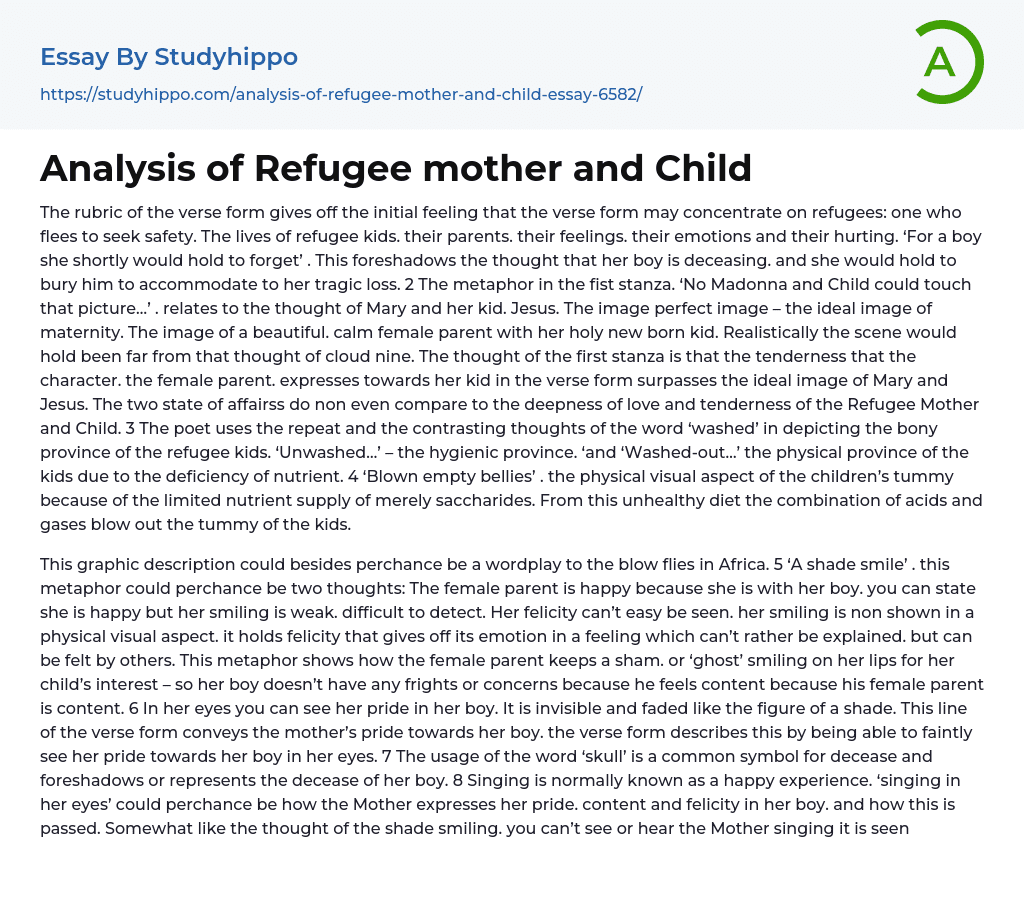
The rubric of the verse form gives off the initial feeling that the verse form may concentrate on refugees: one who flees to seek safety. The lives of refugee kids. their parents. their feelings. their emotions and their hurting. ‘For a boy she shortly would hold to forget’ . This foreshadows the thought that her boy is deceasing. and she would hold to bury him to accommodate to her tragic loss. 2 The metaphor in the fist stanza. ‘No Madonna and Child could touch that picture…’ . relates to the thought of Mary and her kid. Jesus. The image perfect image – the ideal image of maternity. The image of a beautiful. calm female parent with her holy new born kid. Realistically the scene would hold been far from that thought of cloud nine. The thought of the first stanza is that the tendernes
...s that the character. the female parent. expresses towards her kid in the verse form surpasses the ideal image of Mary and Jesus. The two state of affairss do non even compare to the deepness of love and tenderness of the Refugee Mother and Child. 3 The poet uses the repeat and the contrasting thoughts of the word ‘washed’ in depicting the bony province of the refugee kids. ‘Unwashed…’ – the hygienic province. ‘and ‘Washed-out…’ the physical province of the kids due to the deficiency of nutrient. 4 ‘Blown empty bellies’ . the physical visual aspect of the children’s tummy because of the limited nutrient supply of merely saccharides. From this unhealthy diet the combination of acids and gases blow out the tummy of the kids.
This graphic description could besides perchance b
a wordplay to the blow flies in Africa. 5 ‘A shade smile’ . this metaphor could perchance be two thoughts: The female parent is happy because she is with her boy. you can state she is happy but her smiling is weak. difficult to detect. Her felicity can’t easy be seen. her smiling is non shown in a physical visual aspect. it holds felicity that gives off its emotion in a feeling which can’t rather be explained. but can be felt by others. This metaphor shows how the female parent keeps a sham. or ‘ghost’ smiling on her lips for her child’s interest – so her boy doesn’t have any frights or concerns because he feels content because his female parent is content. 6 In her eyes you can see her pride in her boy. It is invisible and faded like the figure of a shade. This line of the verse form conveys the mother’s pride towards her boy. the verse form describes this by being able to faintly see her pride towards her boy in her eyes. 7 The usage of the word ‘skull’ is a common symbol for decease and foreshadows or represents the decease of her boy. 8 Singing is normally known as a happy experience. ‘singing in her eyes’ could perchance be how the Mother expresses her pride. content and felicity in her boy. and how this is passed. Somewhat like the thought of the shade smiling. you can’t see or hear the Mother singing it is seen in her eyes.
9 This simile compares the two thoughts of a normal over looked action in another life and a stamp and cautious
action in their universe. the universe of the Refugee Mother and Child. In this soft action. due to her boies deceasing status. she takes attention while she carefully parts his hair – her manner of gently showing love to her boy. This small act being one of the few things she can make for her boy and one of the few ways she can show her love to him. This action is being compared to seting flowers on a bantam grave of a dead kid because it is a soft and careful action – something you would make really carefully. And ‘tiny grave’ because of her boies small size due to his immature age. If the kid is already passed on when his Mother is separating his hair. this thought of decease links to the distinguishable old usage of the word ‘skull’ . by the poet.
With this grounds. the verse form could besides be after the kid has died and the female parent is still keeping and fondling her kid. gently. carefully and carefully yet – he is no longer alive. This action is explained in a simile and compares her separating his thinning hair to puting flowers on a bantam grave – another nexus to the possible thought that the boy is already dead. The female parent is gently separating her son’s hair as a manner to state adieu. since he has passed on – merely like another signifier of stating good pass. puting flowers on a grave get downing closing and credence.
- American Literature essays
- Between The World and Me essays
- Book Report essays
- Book Review essays
- Book Summary essays
- Books essays
- Character essays
- Coming of Age essays
- Dante's Inferno essays
- Everyday Use essays
- Flowers for Algernon essays
- Genre essays
- Greek Mythology essays
- Incidents in The Life of a Slave Girl essays
- Letter essays
- Literary Criticism essays
- Literary devices essays
- Literature Review essays
- Metaphor essays
- Myth essays
- Play essays
- Plot essays
- Poem essays
- Poetry Analysis essays
- Protagonist essays
- Reader essays
- Reason essays
- Rhetoric essays
- Rhetorical Question essays
- Rhyme essays
- Simile essays
- Tragic Hero essays
- Translation essays
- Understanding essays
- Utopia essays
- Villain essays
- Writer essays
- Adoption essays
- Aunt essays
- Babies essays
- Bedroom essays
- Caring essays
- Children essays
- Daughter essays
- Divorce essays
- Dog essays
- Dysfunctional Family essays
- Family Tradition essays
- Family Values essays
- Father essays



